Stevia: Natural Sweetener or Highly Processed Impostor?
How to determine which brands of Stevia are NOT ultra-processed 'Goo'.
What would you do if you were allergic to aspartame?
Yeah, I can feel some of you freaking out all the way from here.
Diet Coke addicts.
Diabetics who enjoy sweets.
People who eat Keto or Low-Carb diets.
Fitness enthusiasts who eat or drink high-protein products.
Night Life people who enjoy their high energy drinks (with a splash of booze).
If you couldn’t consume these products, it might be a real challenge to your daily habits or way of life.
My husband, Robert, is allergic to aspartame.
If you read my last article on Food Scientists, you’ll know that…
“…some sugar substitutes (like aspartame) are converted by our bodies into formaldehyde (and other ingredients) during metabolism…“
But, it’s not the aspartame that he’s allergic to - it’s the formaldehyde that is generated as part of metabolism.
Aspartame is a processed sugar substitute that is not found in nature, and our bodies know better - we simply don’t process it like a natural food.

But What About Stevia?
Stevia has gained a reputation as a natural, healthy alternative to sugar, but not all stevia products are created equal.
While the stevia plant itself is a legitimate natural sweetener, many commercial brands undergo heavy processing, turning what was once a simple plant into a refined food additive.
Understanding the differences between whole-leaf stevia and its processed counterparts can help you make a better choice for your health.
What Is Stevia, and Where Does It Come From?
Stevia is derived from the Stevia rebaudiana plant, which is native to South America, particularly Paraguay and Brazil.
For centuries, indigenous people have used its leaves to sweeten drinks and medicinal preparations.
Stevia leaves contain natural compounds called steviol glycosides, which give the plant its signature sweetness. It can be 200–300 times sweeter than sugar without the calories.

Is Stevia Organic?
To be considered legitimately organic, stevia must be grown without synthetic pesticides, herbicides, or chemical fertilizers.
However, just because a product is labeled as “organic stevia” doesn’t mean it is minimally processed.
Many organic-labeled stevia products still undergo extensive refining that removes nearly all traces of the original plant.
Whole-Leaf Stevia vs. Commercial Stevia Products
There is a stark difference between stevia in its natural form and the highly processed versions found in grocery stores.
👍 Whole-Leaf Stevia
This is the least processed form of stevia, typically dried and ground into powder or brewed into a tea. It has a slightly bitter, licorice-like taste and retains the plant’s natural properties.
Note: There are a few relatively ‘safe’ brands with Whole-Leaf Stevia, which you can find with a quick Google Search or by asking your preferred AI platform. Do your research before buying these products to make sure as food production ingredients may change.
👎 Stevia Extracts
Some brands extract steviol glycosides using water or alcohol, filtering out plant material while retaining some beneficial compounds.
Note: There are many brands of Stevia extracts that are not highly processed, which you can find with a quick Google Search or by asking your preferred AI platform. Again, do your research, and don’t rely on food label ingredients with these types of products.
❌ Highly Processed Stevia
These products often undergo extensive refining, including chemical processing, bleaching, and the addition of fillers like erythritol, dextrose, or maltodextrin (note: all three of these “fillers” are listed in The Goo Index as processed artificial sweeteners).
At this point, stevia is far from its original form and more akin to an artificial sweetener.
Examples include: Truvia, Stevia in the Raw, Pure Via, Splenda Stevia, SweetLeaf Stevia Packets, Enliten, Sweetleaf Steviaclear Liquid Stevia…and many more.
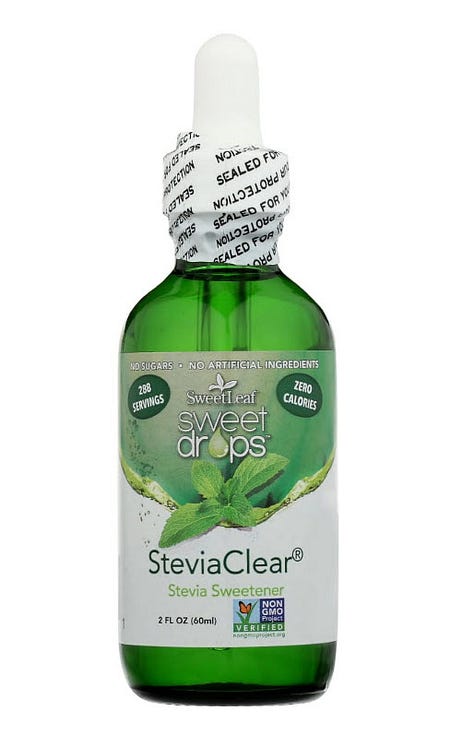
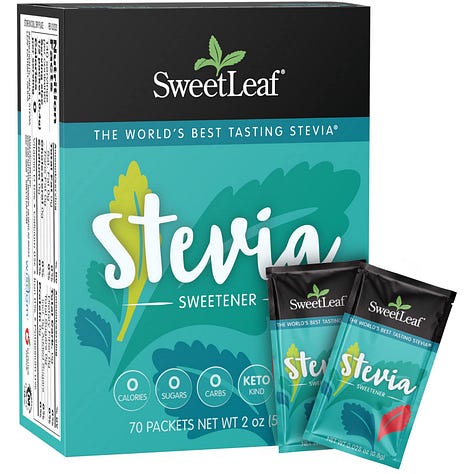
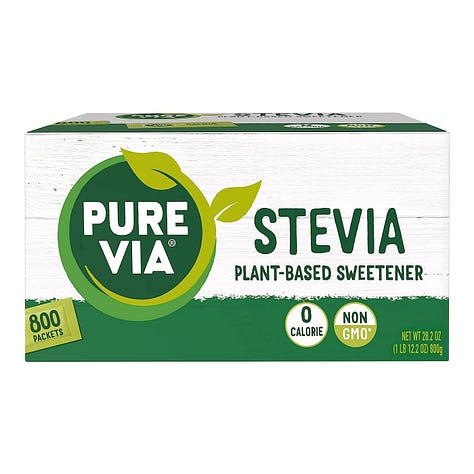
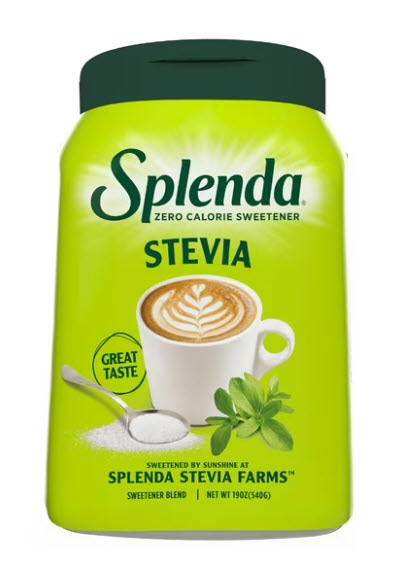
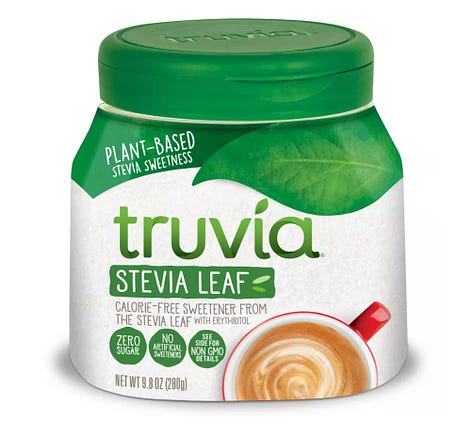
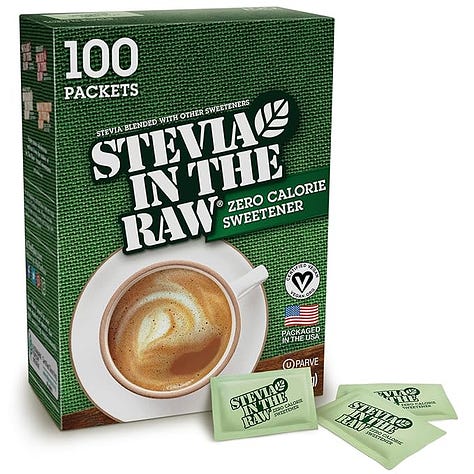
How Processing Methods Impact Health
The degree of processing matters when it comes to health effects.
Whole-leaf stevia and simple extracts maintain the plant’s natural compounds, which may offer antioxidant and anti-inflammatory benefits.
Some studies suggest that unprocessed stevia may help regulate blood sugar and improve insulin sensitivity.
However, highly refined stevia products may not provide the same health benefits.
Some versions contain additives that can cause digestive issues, alter gut microbiota, or spike blood sugar (depending on what they’re mixed with).
Additionally, excessive consumption of certain sugar alcohols found in processed stevia blends (like erythritol) has been linked to bloating and gastrointestinal discomfort.
Is Stevia Better than Sugar or Artificial Sweeteners?
Compared to sugar, stevia has the advantage of being calorie-free and having no impact on blood glucose, making it a better option for those managing diabetes or looking to reduce sugar intake.
When compared to artificial sweeteners like aspartame or sucralose, minimally processed stevia is generally a healthier choice because it comes from a plant rather than being synthetically created.
However, ultra-processed stevia products may be no better than artificial sweeteners due to their chemical alterations and added fillers.
How to Identify a Healthier Stevia Product
If you want to enjoy stevia without the downsides of excessive processing, look for:
Whole-leaf stevia or stevia leaf powder . The most natural form, though it has a stronger, slightly bitter taste.
Pure stevia extract. Look for brands that list only “stevia extract” or “steviol glycosides” without additional ingredients.
Minimal ingredients. Avoid products mixed with dextrose, maltodextrin, or artificial sweeteners. Check The Goo Index to be sure.
Organic and non-GMO certifications. While these don’t guarantee minimal processing, they ensure that the stevia is free from synthetic pesticides and genetic modification.
Stevia can be a great sugar alternative—but only if you choose the right version.
Check The Goo Index to see if there’s Goo in your food products sweetened with stevia!
Whole-leaf stevia and pure extracts provide the benefits of this naturally sweet plant, while highly processed versions may introduce unwanted additives.
By understanding the different forms of stevia and how they’re processed, you can make a more informed decision about the sweeteners you use in your diet.
If you’re not sure about a specific ingredient and want to learn more about whether it qualifies as Goo, leave a comment or reach out and ask me!
And if you enjoyed reading this story, but aren’t ready to subscribe, you can:
(a Goo-Free coffee, of course!)






When I was in Vietnam, I bought one-pound bags of just stevia leaf, referred to as “sweet tea leaf.”
I put a leaf or two into my quart-sized nettle or oat straw infusions and after 6 hour it’s perfectly sweet.
It’s the only sweetener I have used in years. Some folks dislike the aftertaste (similar to the cilantro issue-one either likes it or doesn’t.)
A bag lasts 6 months with every day use.